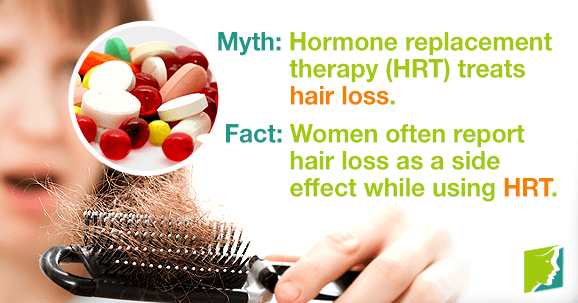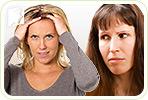Many women define their femininity and beauty by having thick, healthy hair; one recent poll showed that women who felt good about the appearance of the hair automatically felt good about their appearance as a whole. It's no surprise that hair loss is a menopause symptom that often causes more distress than others. Restoring patches of thinness and reviving broken, brittle hair takes time, but certain remedies could aid the process. Keep reading to understand menopausal hair loss and its hormonal, dietary, and lifestyle causes, and find natural solutions to combat it.
MYTH: Hair Loss Is Just Part of Aging
FACT: Hair Loss Is Caused by Hormones, Lifestyle, and Diet
The hormones estrogen, progesterone, and testosterone are known to influence healthy hair growth, though the exact role they play is not fully understood. During perimenopause, when a woman is in her forties, fifties, or sixties, fluctuations in the levels of these hormones can cause internal imbalances that often exacerbate the natural hair loss that occurs as a symptom of aging.
Other causes of hair loss include:
- Depression
- Sleep disorders
- Thyroid problems
- Stress
- Iron deficiency
- Biotin deficiency (i.e., a nutrient found in chard, lettuce, and tomatoes)
- Overuse of hair products (e.g., dyes, straighteners, and curling irons)
MYTH: Iron Supplements Cure Hair Loss
FACT: Healthy Blood Circulation to the Scalp Stimulates Hair Growth
While there are no cures for hair loss in women, there are natural ways to prevent and slow hair loss. Increasing your iron intake is the first advisable step; iron functions primarily as a carrier of oxygen in the bloodstream, so incorporating more of the mineral into your diet by consuming poultry, fish, nuts, legumes, or a supplement could improve blood circulation to the hair follicles and stimulate regrowth.
MYTH: Hormone Replacement Therapy (HRT) Treats Hair Loss
FACT: HRT Can Worsen Hair Loss
Hormone replacement therapy regulates many menopause symptoms by introducing outside estrogen into the body to restore hormonal balance. For many symptoms, this is effective - though there are long-term health risks involved - but women often report hair loss as a side effect while using HRT.
MYTH: Certain Herbs Could Revive Hair
FACT: Herbal Oils with Vitamin E Often Improve Hair Condition
Hair was never “alive”, so it cannot be revived. Be gentle with your hair to prevent damage; avoid dying it, scraping it into tight styles, or using heat products to style it. Nourish the roots by applying a hydrating oil, such as argan or coconut, to hydrate the follicles with vitamin E for strength and shininess.
Sources
- Dinh, Q.Q. & Sinclair, R. (2007). Female pattern hair loss: Current treatment concepts. Clinical Interventions in Aging, 2(2), 189-199. Retrieved from http://www.ncbi.nlm.nih.gov/pmc/articles/PMC2684510/
- McKinley Health Center. (2010). Dietary Sources of Iron. Retrieved June 25, 2014, from http://www.mckinley.illinois.edu/handouts/dietary_sources_iron.html
- Monfalouti, H.E. et al. (2010). Therapeutic potential of argan oil: A review. The Journal of pharmacy and pharmacology, 62(12), 1669-1675. doi: 10.1111/j.2042-7158.2010.01190.x
- Murata, K. et al. (2013). Promotion of hair growth by Rosmarinus officinalis leaf extract. Phytotherapy research, 27(2), 212-217. doi: 10.1002/ptr.4712
- National Center for Complementary and Alternative Medicine. (2012). Lavender. Retrieved June 25, 2014, from http://nccam.nih.gov/health/lavender/ataglance.htm
- National Health Service UK. (2012). Hair loss - Causes. Retrieved June 26, 2014, from http://www.nhs.uk/Conditions/Hair-loss/Pages/Causes.aspx
- National Health Service UK. (2012). Hair loss - Treatment. Retrieved June 26, 2014, from http://www.nhs.uk/Conditions/Hair-loss/Pages/Treatment.aspx
- Park, S.Y. et al. (2013). Iron plays a certain role in patterned hair loss. Journal of Korean medical science, 28(6), 934-938. doi: 10.3346/jkms.2013.28.6.934
- Riedel-Baima, B. & Riedel, A. (2008). Female pattern baldness may be triggered by low oestrogen to androgen ratio. Endocrine regulations, 42(1), 13-16. Retrieved from http://www.ncbi.nlm.nih.gov/pubmed/18333699




